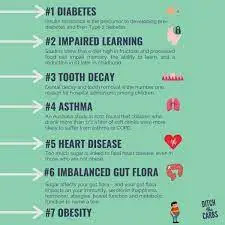 |
15 Reasons Why Too Much Sugar Is Bad for You
I. Introduction
When it comes to our diet, one particular ingredient has received a significant amount of attention in recent years: sugar. While sugar can undoubtedly make our taste buds sing, its excessive consumption has been linked to numerous adverse health effects. In this article, we will explore fifteen compelling reasons why consuming too much sugar can harm your health and well-being.
II. Understanding Sugar
What is sugar?
Sugar is a sort of starch that furnishes the body with energy. It happens normally in natural products, vegetables, and dairy items. However, the sugar we commonly refer to is refined sugar, which is derived from sugar cane or sugar beets.
Different types of sugar
There are various types of sugar, including sucrose (table sugar), fructose (found in fruits), and lactose (found in milk). Additionally, high-fructose corn syrup is a common sweetener used in many processed foods and beverages.
How sugar affects the body
When consumed, sugar is broken down into glucose, which enters the bloodstream and provides energy to the body's cells. However, excessive sugar consumption can overwhelm the body's ability to process it, leading to adverse effects.
III. Negative Effects of Excessive Sugar Consumption
Weight gain and obesity
Consuming sugary foods and beverages regularly can contribute to weight gain and obesity. Sugar is high in calories and lacks the necessary nutrients to keep us satiated.
Increased risk of type 2 diabetes
Excessive sugar intake can lead to insulin resistance, increasing the risk of developing type 2 diabetes. It puts a strain on the pancreas and disrupts the body's ability to regulate blood sugar levels effectively.
Dental problems
Sugar is an essential supporter of tooth rot and holes. Hurtful microbes in the mouth feed on sugar, creating acids that dissolve tooth lacquer.
 |
Energy crashes and fatigue
While sugar can provide a quick burst of energy, it is often followed by a crash, leaving you feeling tired and lethargic.
Impact on heart health
Consuming too much sugar can contribute to high blood pressure, inflammation, and an increased risk of heart disease.
Promotes inflammation
Excessive sugar consumption triggers an inflammatory response in the body, which is linked to various chronic diseases, including arthritis and autoimmune disorders.
Accelerated aging process
Sugar can contribute to premature aging by causing glycation, a process in which sugar molecules attach to proteins, leading to the formation of harmful advanced glycation end products (AGEs).
Nutritional deficiencies
Foods high in added sugars often lack essential nutrients, displacing healthier options from the diet and potentially leading to nutrient deficiencies.
Impaired cognitive function
Studies have shown a connection between excessive sugar consumption and impaired cognitive function, including memory problems and decreased learning ability.
Risk of certain cancers
High sugar intake has been associated with an increased risk of developing certain types of cancer, such as breast, colorectal, and pancreatic cancer.
Affects liver health
When consumed in excess, sugar can overload the liver, leading to fatty liver disease and an increased risk of liver damage.
Weakened immune system
Sugar can smother the safe framework, making you more vulnerable to diseases and ailments.
Mood swings and mental health issues
The consumption of sugary foods can lead to rapid spikes and drops in blood sugar levels, which can affect mood, contributing to irritability and mental health issues.
Addiction and cravings
Sugar can be exceptionally habit-forming, prompting desires and a pattern of overconsumption that can be trying to break.
Poor skin health
Excessive sugar intake can contribute to skin problems such as acne, wrinkles, and premature aging.
IV. Tips for Reducing Sugar Intake
Read food labels
Pay attention to the sugar content in packaged foods and choose options with lower sugar content.
Choose whole foods
Opt for whole foods like fruits, vegetables, lean proteins, and whole grains, which contain natural sugars and provide additional nutritional benefits.
Opt for healthier alternatives
Replace sugary snacks and desserts with healthier alternatives such as fresh fruits, unsweetened yogurt, or homemade treats using natural sweeteners.
Gradually reduce sugar consumption
Rather than cutting out sugar completely, gradually reduce your intake to allow your taste buds to adjust.
Be mindful of beverages
Sugary drinks like soda, fruit juices, and energy drinks can contribute a significant amount of sugar to your diet. Pick water, unsweetened tea, or mixed water all things being equal.
Cook meals at home
Preparing meals at home gives you more control over the ingredients and allows you to reduce added sugars in your dishes.
Practice portion control
Be mindful of portion sizes, as even healthy foods can contribute to excess sugar intake if consumed in large quantities.
Find healthier ways to satisfy cravings
Instead of reaching for sugary treats, try satisfying your cravings with fresh fruit, nuts, or dark chocolate in moderation.
Stay hydrated
Drinking enough water helps curb cravings and keeps your body hydrated, reducing the urge to consume sugary beverages.
Get enough sleep
Lack of sleep can lead to increased cravings for sugary foods as a source of quick energy. Aim high extended lengths of significant worth rest each night.
V. Conclusion
Excessive sugar consumption can have numerous detrimental effects on your health and well-being. From weight gain and increased risk of chronic diseases to impaired cognitive function and poor skin health, it's clear that reducing sugar intake is essential. By making mindful choices, reading food labels, and opting for healthier alternatives, you can take control of your sugar consumption and improve your overall health.
VI. FAQs
How much sugar is considered excessive?
The American Heart Association recommends limiting added sugar intake to no more than 25 grams (6 teaspoons) for women and 36 grams (9 teaspoons) for men per day.
Can I still enjoy desserts in moderation?
Yes, you can enjoy desserts in moderation as long as they are part of a balanced diet and you make healthier choices, such as opting for desserts with natural sweeteners or smaller portions.
Are artificial sweeteners a healthier alternative?
Artificial sweeteners can be an option for reducing sugar intake, but their long-term effects are still under debate. Moderation is key, and natural sweeteners like stevia or monk fruit can be healthier alternatives.


.png)
.webp)
.png)